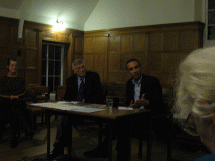The Flight of the Intellectuals

There ain't no Muslim Sisterhood...Tariq Ramadan at Oxford, 2009 (photo by Kaihsu Tai)
(by Paul Berman)
This hasty, readable, tendentious book bills itself as an attack on liberal intellectuals, and in particular, their inability to confront the paradox of a modern Islamism that hearkens back to its glory days of stony fundamentalism. But really, it is an assault on one man. Via that attack, the book ends up saying important things about the impulse of humans (even and perhaps especially those of ‘superior intellect’) to choose sides, deny opposing points of view, and draw near to attractive extremes.
Berman, from the outset, leaps straight at his target, Swiss-born Tariq Ramadan, the controversial Islamic philosopher, alleged here to be an apologist for Islamic excess. First come the sins of the fathers. Ramadan’s grandfather was Hassan al-Banna, founder of the Muslim Brotherhood, and his father, Said, carried on the cause, even in Swiss exile. Al-Banna venerated Haj Amin al-Husseini, the Grand Mufti of Jerusalem, who was a big fan of Nazi nullification-of-Jews policy. Tariq Ramadan is disinclined to condemn these gents, perhaps understandably so, given the family history. (He also pays a lot of attention to Yusuf al-Qaradawi, not a big fan of modern freedom and enlightenment). These men seem to prefer the traditionalist Islamism of al-Ghazali to the rationalist philosophy of Ibn Sina.
Moreover, Ramadan is on record as a leading proponent of moderate Islam. Berman quotes his aims, stated in his book Western Muslims and the Future of Islam, thus: “to protect the Muslim identity and religious practice, to recognize the Western constitutional structure, to become involved as a citizen at the social level, and to live with true loyalty to the country to which one belongs.” Rather than state the obvious – that these aspirations, in an Islamist context, are so contradictory as to be perverse – Berman instead seeks to undermine them as disingenuous.
This is a harder, more dangerous task, but as he warms to it (despite heaping ambiguity upon speculation upon ambiguity), Berman begins to cut through. Ramadan presents as a reformist and deplores terrorism. He upholds western liberal values. He applauds equal rights for women. Yet he is tantalisingly equivocal as to these matters in specific instances. On Palestine, “[A]rmed resistance was incumbent so that the plans of the terrorists or Irgun and of all Zionist colonizers would be faced up to.” In the notorious debate on French TV in 2003, on the stoning to death of women who commit adultery, Ramadan favoured a ‘moratorium’ on the practice, “in order to have a true debate. And my position is that if we arrive at a consensus among Muslims, it will necessarily end.” As his opponent in debate, Nicolas Sarkozy, more-or-less said, “WTF?” These instances, and others, tend to undermine Ramadan’s moderate pronouncements.
Of course, it is impossible to be consistent in matters of morals and ethics, the lowest rungs on the ladder of philosophy. Especially so where, as religious dogma, it becomes political, and ‘weaponised.’ But Berman makes the point that this “dark smudge of ambiguity” and relativist polemic render all of Ramadan’s “repeated calls for reason and dialogue and an open-minded spirit, his denunciations of bigotry and unfairness” as nothing. You can’t credibly claim to be a Salafist reformer if your ‘soft spot for the seventh century’ evokes an ataraxic response to, say, suicide bombing, honour killings, enforced wardrobes, segregation, denial of services to women, group rapes, enforced marriages, and genital mutilation.
Only in the final chapter does Berman widen his discourse to challenge the laziness, group-think, ignorance and contempt of today’s western intellectuals en bloc, with their Rousseau-style condescension, haughty spite, and auto-hate. This is the most entertaining part of the book because the author removes not only his gloves but the webbing as well, and swings wide and deep. He queries why the cream of western journalism tends to venerate people such as Ramadan, and disparage folks such as Ayaan Hirsi Ali. One might suggest that certain elite elements, hiding under a cloak of free-thinking, want to dictate thought to us and don’t like uppity third-worlders teaching us instead. Especially if they are annoying, or glamourised, or there is uncertainty about their positioning on the political spectrum.
I have not read Ramadan’s works, and there is always an issue of translating foreign texts covering something as amorphous as ethics, but Berman does powerfully convey the sense that Ramadan, and his leftist claques (without the courage to test their outlook against those of others, or inconvenient facts, or in the face of threats) are stuck in a cage of their own making, powerless to think, in disbelief of thinking; in Rilke’s words, a panther whose “vision, from constantly passing bars, has grown so weary that it cannot hold anything else.”
Leave a comment...
While your email address is required to post a comment, it will NOT be published.


2 Comments